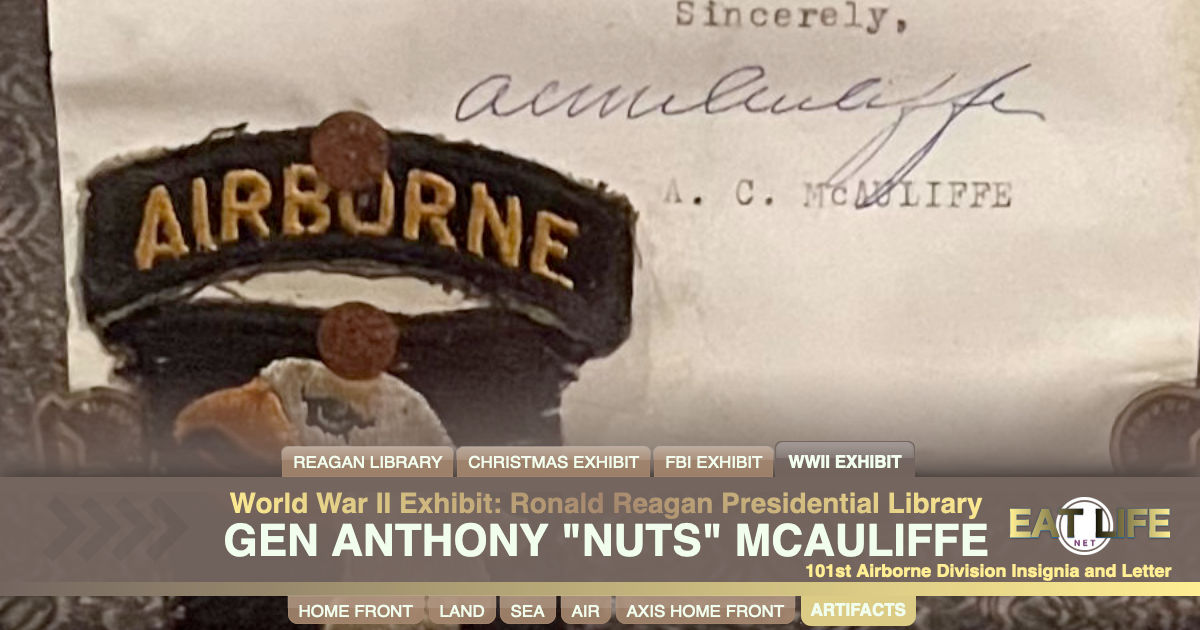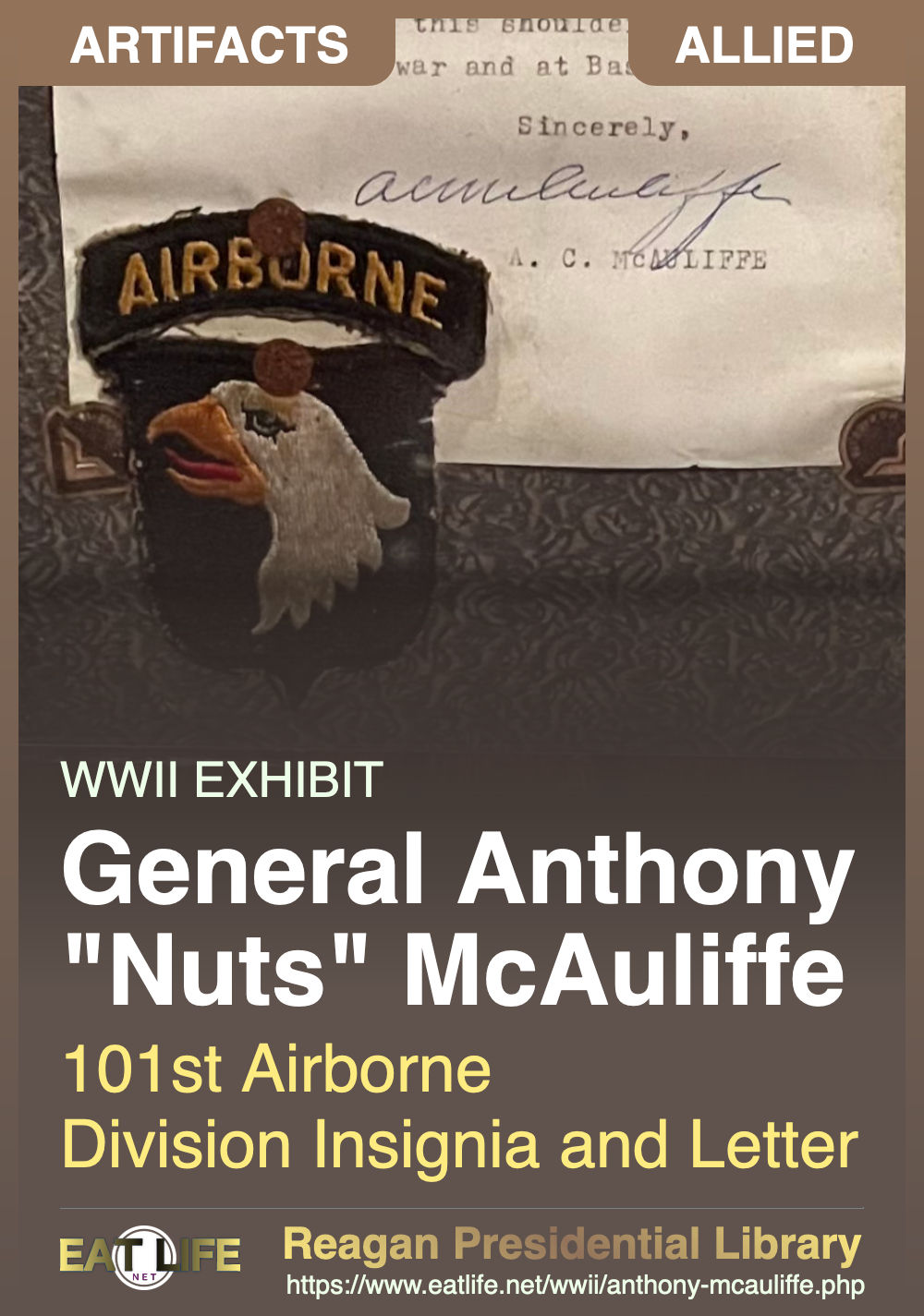To the German Commander. NUTS! The American Commander.
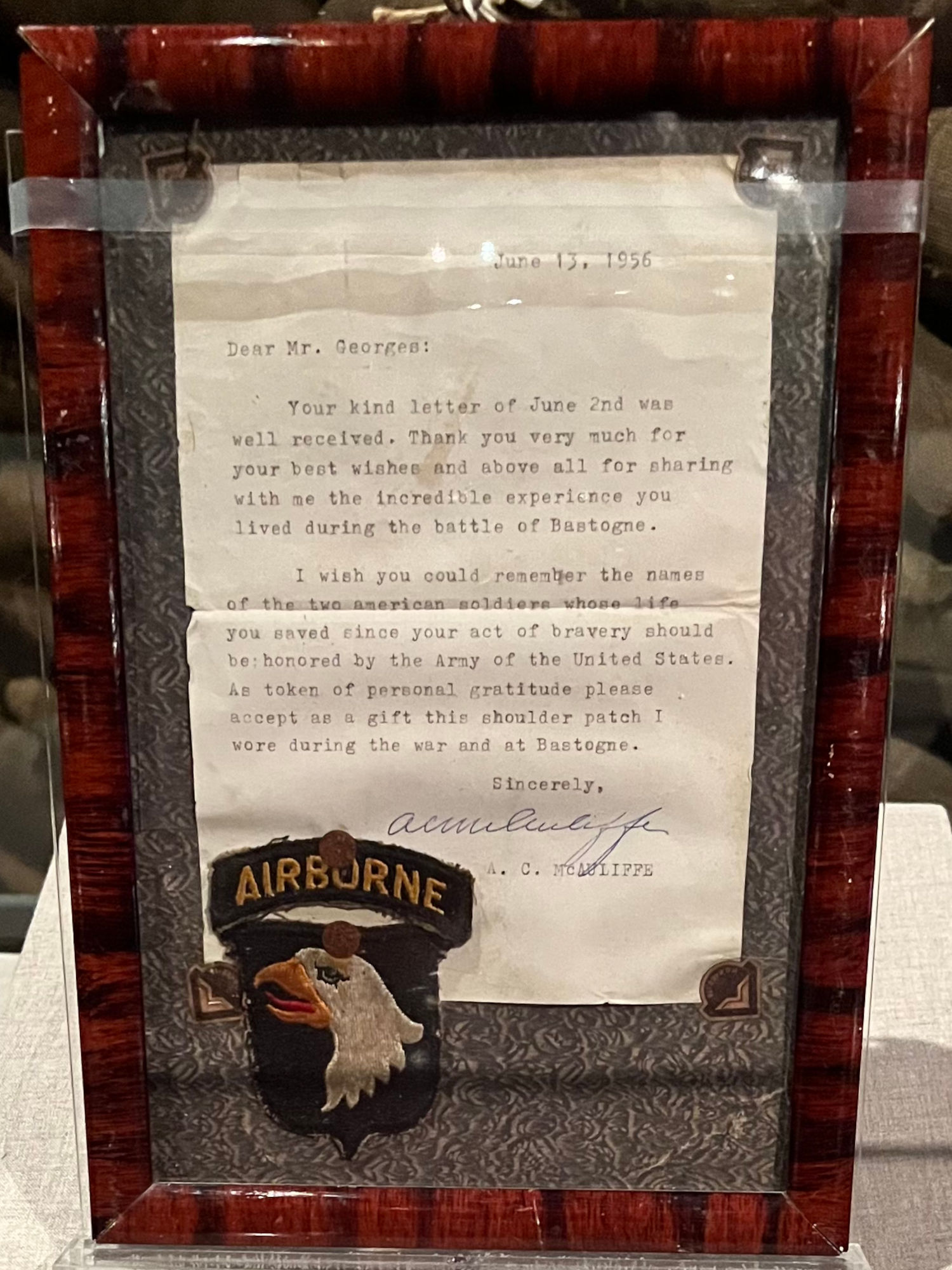
1956
GEN Anthony McAuliffe was famous for his one-word response to a German ultimatum during the Battle of the Bulge, demanding his surrender. His answer: "NUTS!" This was the shoulder patch he wore during WWII, including at Bastogne.
June 13, 1956
Dear Mr. Georges:
Your kind letter of June 2nd was well received. Thank you very much for your best wishes and above all for sharing with me the incredible experience you lived during the battle of Bastogne.I wish you could remember the names of the two American soldiers whose life you saved since your act of bravery should bet honored by the Army of the United States. As token of personal gratitude please accept as a gift this shoulder patch I wore during the war and at Bastogne.
Sincerely
General A.C. McAuliffe
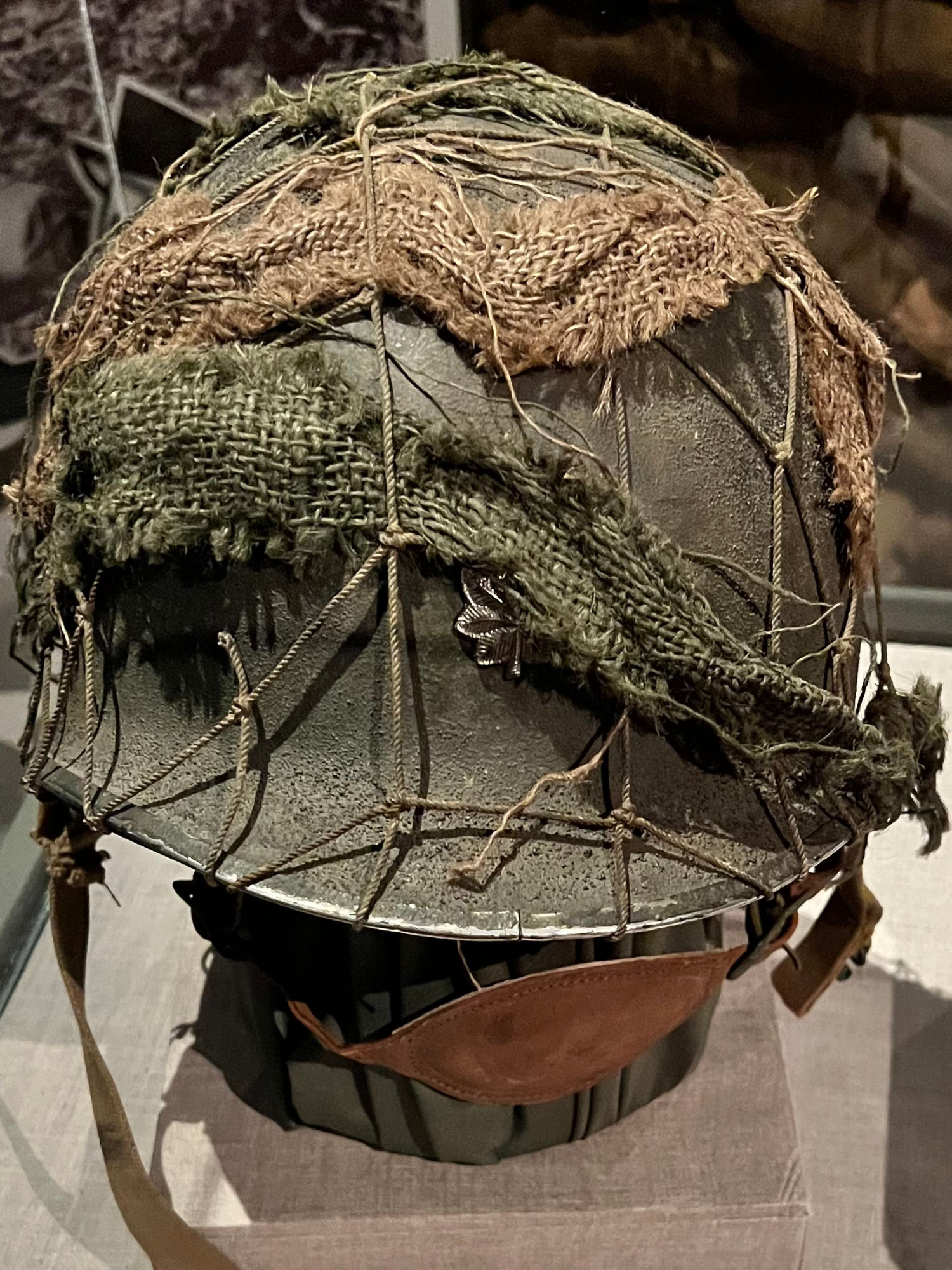
1944-1945

1944
The Distinguished Service Cross for the Defense of Bastogne.
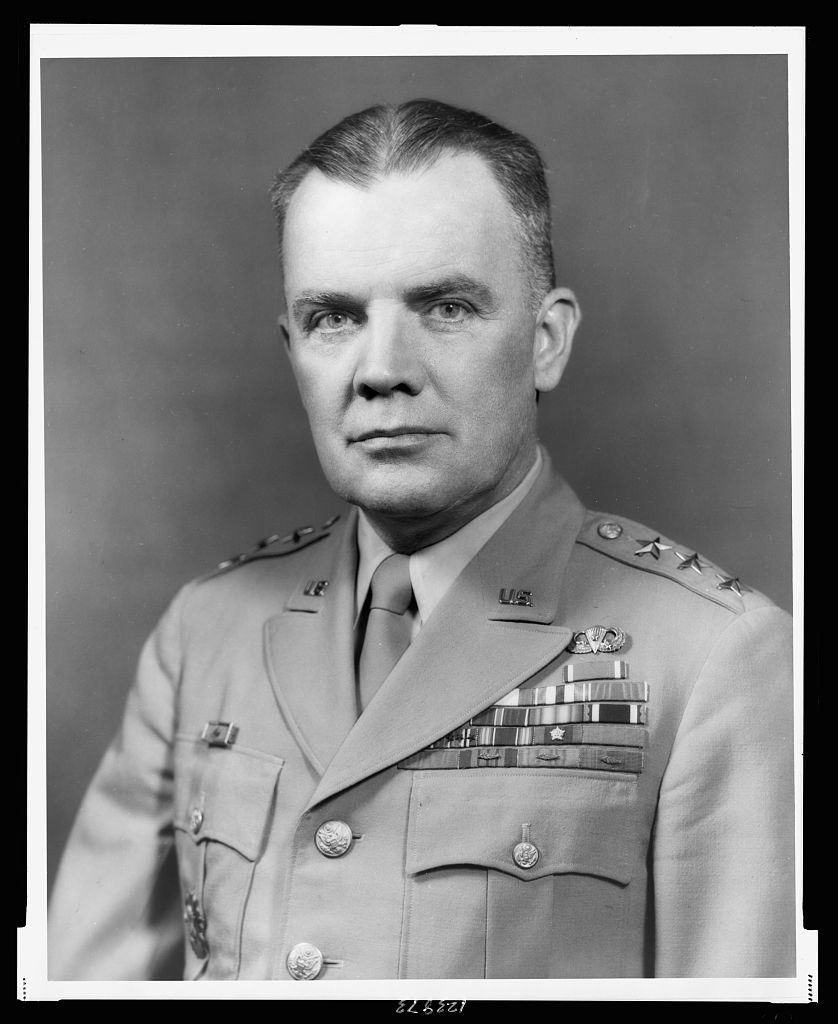
Aug. 13, 1951
Lt. Gen. Anthony C. McAuliffe, head-and-shoulders portrait, facing slightly left, wearing Army uniform.
By December 1944, Allied generals felt confident that victory over Nazi Germany was near. Their armies had raced across France and were now approaching the Rhine River. No one thought the German Army could launch such a large-scale winter offensive.The generals were spectacularly wrong. On December 16, more than 200,000 German troops and 1,000 tanks attacked along a 75-mile front through Belgium's snowy Ardennes forest. As the Germans advanced, they created a "bulge" in the American lines. American soldiers resisted fiercely, but failed to stop the Germans. They did, however, delay them at several key road junctions. The most celebrated of these defensive actions came at the town of Bastogne where troops from the 101st Airborne Division and elements of other units were besieged.
On December 22, German officers under a flag of truce approached the American lines demanding Bastogne's surrender. After reading the demand, Gen. Anthony McAuliffe, the American commander in Bastogne, remarked, "Aw, nuts!" Further discussion failed to improve on his first reaction, and "NUTS!" became his famous one-word response. When the Germans failed to understand, an American officer explained, "in plain English it is the same as 'Go to hell!'"
WIKIPEDIAAnthony Clement "Nuts" McAuliffe
July 2, 1898 – August 10, 1975
a senior United States Army officer who earned fame as the acting commander of the 101st Airborne Division defending Bastogne, Belgium, during the Battle of the Bulge in World War II. He is celebrated for his one-word reply to a German surrender ultimatum: "Nuts!"After the battle, McAuliffe was promoted and given command of the 103rd Infantry Division, which he led from January 1945 to July 1945. In the post-war era, he was commander of United States Army Europe.
Brigadier General McAuliffe commanded the division artillery of the 101st Airborne Division when he parachuted into Normandy on D-Day. He also landed by glider in the Netherlands during Operation Market Garden.
In December 1944, the German army launched the surprise attack that became the Battle of the Bulge. Major General Maxwell D. Taylor, commander of the 101st Airborne Division, was attending a staff conference in the United States at the time. During Taylor's absence, McAuliffe commanded the 101st and its attached troops. At Bastogne, the 101st was besieged by a far larger force of Germans under the command of General Heinrich Freiherr von Luttwitz.
On December 22, 1944, von Luttwitz dispatched a party, consisting of a major, a lieutenant, and two enlisted men under a flag of truce to deliver an ultimatum. Entering the American lines southeast of Bastogne (occupied by Company F, 2nd Battalion, 327th Glider Infantry), the German party delivered the following to Gen. McAuliffe:
German ComanderTo the U.S.A. Commander of the encircled town of Bastogne.The fortune of war is changing. This time the U.S.A. forces in and near Bastogne have been encircled by strong German armored units. More German armored units have crossed the river Ourthe near Ortheuville, have taken Marche and reached St. Hubert by passing through Hompre-Sibret-Tillet. Libramont is in German hands.
There is only one possibility to save the encircled U.S.A. troops from total annihilation: that is the honorable surrender of the encircled town. In order to think it over a term of two hours will be granted beginning with the presentation of this note.
If this proposal should be rejected one German Artillery Corps and six heavy A. A. Battalions are ready to annihilate the U.S.A. troops in and near Bastogne. The order for firing will be given immediately after this two hours term.
All the serious civilian losses caused by this artillery fire would not correspond with the well-known American humanity.
The German Commander.
According to those present when McAuliffe received the German message, he read it, crumpled it into a ball, threw it in a wastepaper basket, and muttered, "Aw, nuts". The officers in McAuliffe's command post were trying to find suitable language for an official reply when Lt. Col. Harry Kinnard suggested that McAuliffe's first response summed up the situation pretty well, and the others agreed. The official reply was typed and delivered by Colonel Joseph Harper, commanding the 327th Glider Infantry, to the German delegation. It was as follows:
Gen McAuliffeTo the German Commander.NUTS!
The American Commander.
The German major appeared confused and asked Harper what the message meant. Harper said, "In plain English? Go to hell." The choice of "Nuts!" rather than something earthier was typical for McAuliffe. Captain Vincent Vicari, his personal aide at the time, recalled that "General Mac was the only general I ever knew who did not use profane language. 'Nuts' was part of his normal vocabulary."
The artillery fire did not materialize, although several infantry and tank assaults were directed at the positions of the 327th Glider Infantry. In addition, the German Luftwaffe attacked the town, bombing it nightly. The 101st held off the Germans until the 4th Armored Division arrived on December 26 to provide reinforcement.
For his actions at Bastogne, McAuliffe was awarded the Distinguished Service Cross by General Patton on December 30, 1944 with official orders processed on January 14, 1945. He later received the Army Distinguished Service Medal twice, the Silver Star and the Legion of Merit.
Immediately after Bastogne, McAuliffe was promoted to major general and given command of the 103rd Infantry Division on January 15, 1945, his first divisional command assignment, which he retained until July 1945.









